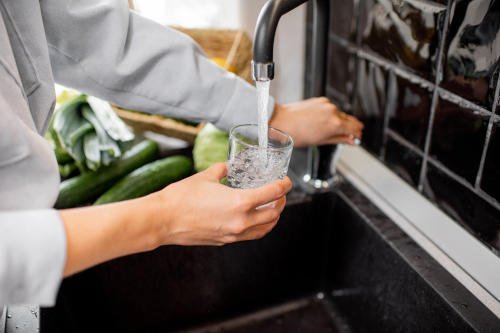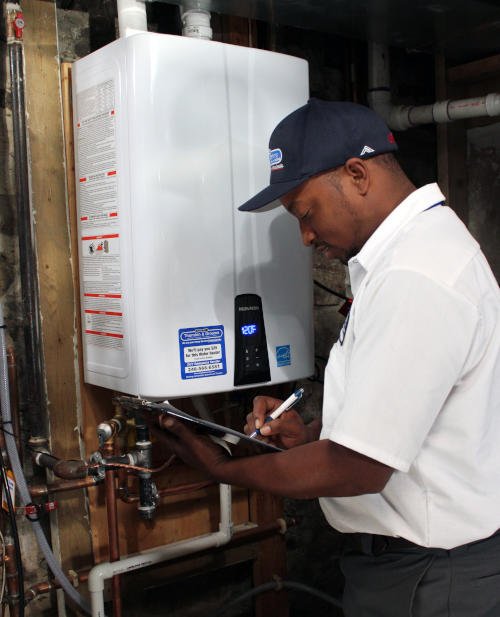Best Type of Home Water Filtration System in Michigan

Install a water filtration system to ensure cleaner water for your home.
What’s your why for wanting cleaner water in your home? Maybe you’re immunocompromised, have children in your home, or are simply concerned about what goes into your body every day.
Whatever your reason, you’re probably wondering what’s the best type of home water filtration system in Michigan. The answer is...it depends!
The best type of home water filtration system for your Michigan home depends on two factors:
- What contaminants are already in your water
- What you want to remove.
Keep reading to find out:
- What contaminants might be in your water (and how to find out!)
- The difference between whole-home and point-of-use filtration
- Common types of home filtration systems
Would you rather have a professional break down all of the options for you? Give a Thornton & Grooms plumber a call for same-day water quality service!
What contaminants might be in your water
Before you decide what contaminants you want your water filter to take out, you need to figure out what contaminants are already in your home’s water. Because different filters target different contaminants—such as chemicals, bacteria, or organic materials—it’s important to start by identifying the contents of your water.
If your water is from a public system, you’ll receive a yearly report with your water bill outlining the quality of your drinking water and its levels of various contaminants.
If your water is not from a public system, you have a couple of options for testing your water quality. While DIY water quality tests are available, they are often inaccurate. To get the most accurate information, it’s a good idea to have a water quality analysis performed by a licensed plumber (we do this for free!).
Keep in mind, not every contaminant needs to be filtered out. For example, water treatment plants add chlorine to your water to disinfect it and fluoride to prevent tooth decay.
You can find many potential contaminants in water everywhere, but some commonly found in Michigan homes are:
- Arsenic—Levels of this heavy metal are naturally high in Michigan water. Exposure in large amounts can result in serious health problems.
- Nitrate—Nitrates can enter a Michigan home’s water supply through agricultural waste, fertilizers, and septic systems. There is evidence that nitrates are dangerous for infants and may cause pregnancy complications.
- Perfluoroalkyl and polyfluoroalkyl substances (PFAS)—This group of chemicals can impact reproduction and development.
- Lead—Lead can enter the water supply through lead service lines or plumbing soldered with lead. The Environmental Protection Agency advises that there is no safe amount of lead in drinking water because it is dangerous even at minimal levels of exposure.
- Volatile organic compounds (VOCs)—This group of compounds can enter the water supply through fuel spills or industrial waste disposal.
Once you know what’s in your water, you’re ready to decide which home water filtration system is best for your home.
The difference between whole-home and point-of-use filtration
One additional factor to consider when choosing a home water filtration system is whether you want a “whole home” system or a “point-of-use” system. Whole-home systems filter all of the water in your home, including water used for bathing, drinking, and cleaning. Meanwhile, point-of-use systems only filter water at specific taps.
Depending on which contaminants are in your water, you might prefer a whole-home system or a point-of-use system. For example, if you don’t want VOCs in your drinking water or bathing water, a whole-home system can be a good option if your water contains VOCs.
A professional can help you determine whether a whole-home or point-of-use system is a better option for your home.
Common types of home filtration systems
Now that you know what you want your water filter to filter out and how much of your water it’s going to filter, it’s time to decide which type of filter you want.
The most common types of water filtration systems are:
- Activated carbon ($2,200–$2,500)
- Reverse osmosis ($1,700–$2,400)
- UV ($1,500–$1,700)
- Water softeners
We’ll discuss each in greater detail below.
Activated carbon
Activated carbon filters work by using carbon like a magnet to pull organic contaminants (such as pesticides, lead, or chlorine) out of your drinking water. Activated carbon filters do not filter out heavy metals, bacteria, microorganisms, or fluoride.
Reverse osmosis
Reverse osmosis filters use a high-pressure pump to force water through a membrane too small for contaminants. These filters can remove viruses, bacteria, dirt, and common chemical contaminants (such as lead). They can also reduce the presence of nitrates and arsenic in the water.
UV
UV filters use a high-frequency light to remove living contaminants (e.g., bacteria, parasites, and viruses) from water. Because these filters do not work on non-living contaminants (such as chemicals), homeowners typically use them in conjunction with another water filtration system.
Water softeners
If you live in Michigan, you’ve heard of “hard water.” Hard water has a high mineral content (in particular, magnesium and calcium) which can cause soap scum and scale. Water softeners fix hard water by using ion-exchange technology to reduce calcium and magnesium buildup in water. Some water softeners can also reduce nitrates, arsenic, and heavy metals.
Cleaner water is just a phone call away!

Thornton & Grooms plumbers are ready to install your water filtration system.
With water quality services from Thornton & Grooms, you’ll get:
- Upfront, flat-rate pricing
- Free water quality testing
- Same-day service
We can’t wait to hear from you! Schedule service today!
